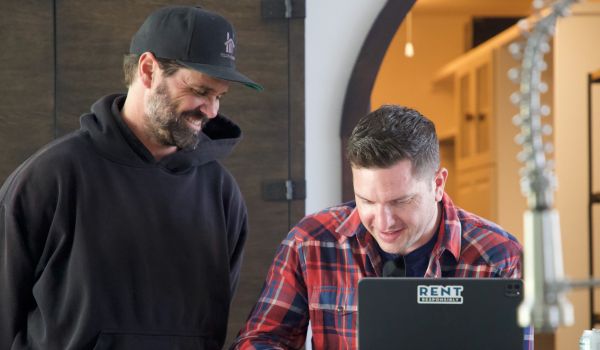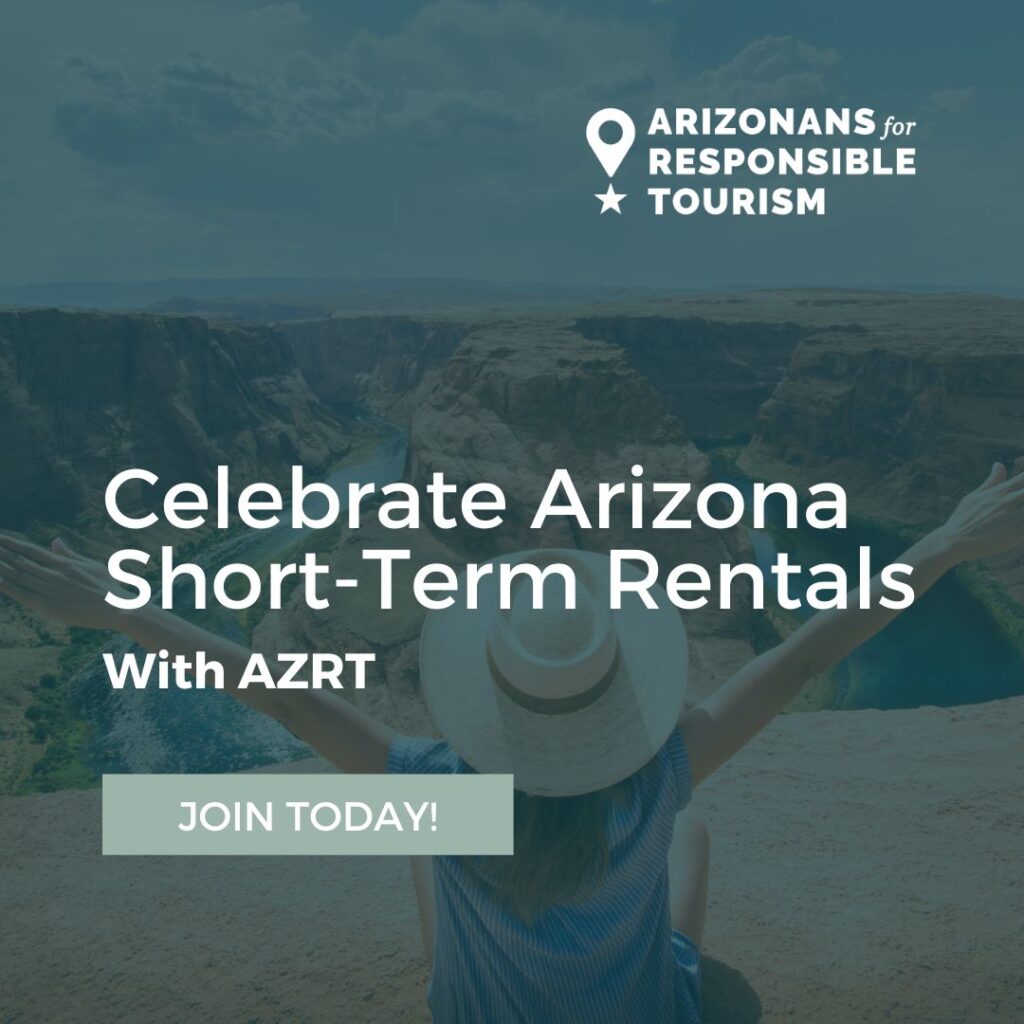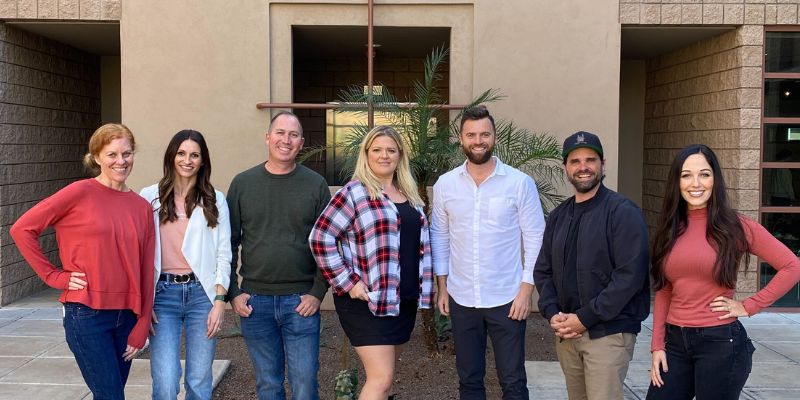Feature Image: John Hildebrand, Hilde Homes and Dana Lubner, Rent Responsibly
“Reading, let alone reading in public, is like the biggest fear on Earth to me,” said John Hildebrand, founder of Hilde Homes. He has dyslexia. “In school, when I had to do public speaking, I would either run out of the classroom or not show up to school that day.”
So right out of college, the short-term rental host chose a career as a professional photographer, preferring to express himself through images instead of the spoken word or writing.
A fear of public speaking
He learned to face his fear of public speaking when a proposed law in the Arizona Legislature threatened the future of his short-term rental business.
“I didn’t have a choice. It was like do or die,” John said.
Almost since its inception, Arizona’s preemption law, passed in 2016 through Senate Bill 1350, has been under attack by STR opponents.
The law prohibits cities from banning or capping the number of short-term rentals in the community and prevents cities from regulating short-term rentals differently from long-term rentals.
Perennially, opponents propose legislation that would overturn the law and allow cities to decide whether to ban, cap, or regulate short-term rentals.
John had just recently moved to Scottsdale, Arizona, from California to launch a full-scale short-term rental business, when one of these pieces of legislation came to the forefront.
Before that, he had been more of a hobby host, short-term renting rooms in his condo in Malibu to supplement his income as a photographer. He never thought of hosting as a profession until he and his family started earning more and more income from short-term renting.
Together, he, his mother, and his brother bought three more properties to operate as short-term rentals.
Becoming the ‘go-to policy guy’
John met Dave Krauss, co-founder and CEO of Rent Responsibly, through a common connection and had spoken to him about proposed STR regulations in Malibu. When asked where he lived, John said he and his family were based in Arizona.
So when STR legislation surfaced again in Arizona, Dave reached out to John to encourage him to advocate for other hosts at local policymaking meetings and in newspaper articles.

He would ask John to speak at a legislative hearing, a city council meeting, or to the local news channel.
John’s automatic response was, “What? I can’t do that. I have no idea what to say. I’m not a good public speaker.”
But with Dave’s coaching, John began to feel greater confidence that he could be a spokesperson for Arizona hosts.
Dave and Dana Lubner, Rent Responsibly’s Director of Community Development, would mentor and coach John on strategies for public speaking. Sometimes they would rewrite speeches or presentations so that it was dyslexia-friendly. For example, people with dyslexia typically can find more success in reading material that uses active rather than passive voice and contains short sentences.
After some time, “I was kind of becoming this go-to policy guy,” John said.

When the legislation to reverse Arizona’s preemption law gained steam, Rent Responsibly hosted a meeting to recruit a statewide leadership team to advocate for hosts in the Legislature. They invited John and a handful of other hosts who became the founding members of Arizonans for Responsible Tourism, a statewide short-term rental alliance. As a team, they could combine their talents and strategically deploy their energies where it was needed most.
“I worked so much for myself my whole life, so it was kind of nice to feel a part of this bigger picture of a group where we’re all doing the same thing,” John said.
He gained motivation from other members of the alliance and from Dave and Dana.
“Public speaking in front of a live audience still is not high on my list of things to do anytime. It’s still very scary to me,” he said. “But I’ve gotten a little bit more comfortable speaking to the city council and lawmakers because I see the results.”
Finding common ground
One of the strategies that John learned was reframing the way he thought about debates for policy. He likes to refer to these disagreements as education rather than a battle.
“We have to educate hosts to be better hosts and better neighbors, and then, we have to educate the opposing side,” he said. “Most of their arguments we support as well, like, we don’t want party houses, we don’t want 50 cars on the street, and we don’t want to be a nuisance at all. I think it’s about finding common ground.”
He has had personal meetings and sit-downs with the opposing side many times, and that communication has helped to find areas where STR hosts and neighbors have common goals.
So far, the results have been a win-win for STR hosts and the community. State law still prohibits bans and caps, but cities have gained some authority to penalize irresponsible operators.
“That was a huge step forward with the opposing side,” he said. “They gained more respect for what we were trying to do.”
John plays a role in educating hosts at AZRT and as an Airbnb Ambassador, where new hosts can ask him questions or seek out mentorship.

“I get to share tips and tricks of hosting with people and help them start their journey on a smoother path than how bumpy mine was, just learning from trial and error,” he said.
So far, he has helped about 1,800 new hosts through the Airbnb platform through the “Ask a Superhost” button.
He answers questions from newbie hosts and reviews their listings before they go live. After looking at the reviews, he might recommend professional photography. Or if the host needs a cleaner, he might help the host find one with specialization in short-term rentals.
“It’s kind of like a mentorship program,” he said.
When mentoring a new host, he emphasizes the importance of being legal, which means looking up local STR regulations and making sure they are in compliance.
“Do you have your permits? Do you have your license number? Are you registered with the city or county? How many days can you short-term rent per month? To me that’s the top of the list,” he said.
Every host has a role
Not every short-term rental advocate must be engaged at the state Legislature to make a difference. Alliance members can make contributions to advocacy in different ways, and everyone has a talent to offer, John said.

“There’s a role for everyone, no matter what kind of level of experience you have, or don’t have,” he said. “Like we have somebody who all she does right now is help us on social media and help us make graphics. And that is a huge help for us because we can’t do everything. We have somebody else who loves reading policy and figuring out what all these words mean, and then is able to highlight the takeaways for others.”
And if you can’t physically help, make a donation, he added.
“I always encourage people to get involved in any way possible, even if it’s as simple as joining an email list,” he said. “So when we’re going down to the city council or Arizona Legislature, we can be like, we have 10,000 members now. Like that’s a big thing.”
John recently had dinner with his family and reflected with them on how much short-term rentals and advocacy have changed his life.
“It’s just mind-blowing,” John said. “My life has literally taken a 720-degree turn. Never in a million years did I ever think I would be here, that I could own four houses and be my own boss and become a [public] speaker.”
Get Involved Find Your Local Alliance
…
SUBSCRIBE TO GET UPDATES



